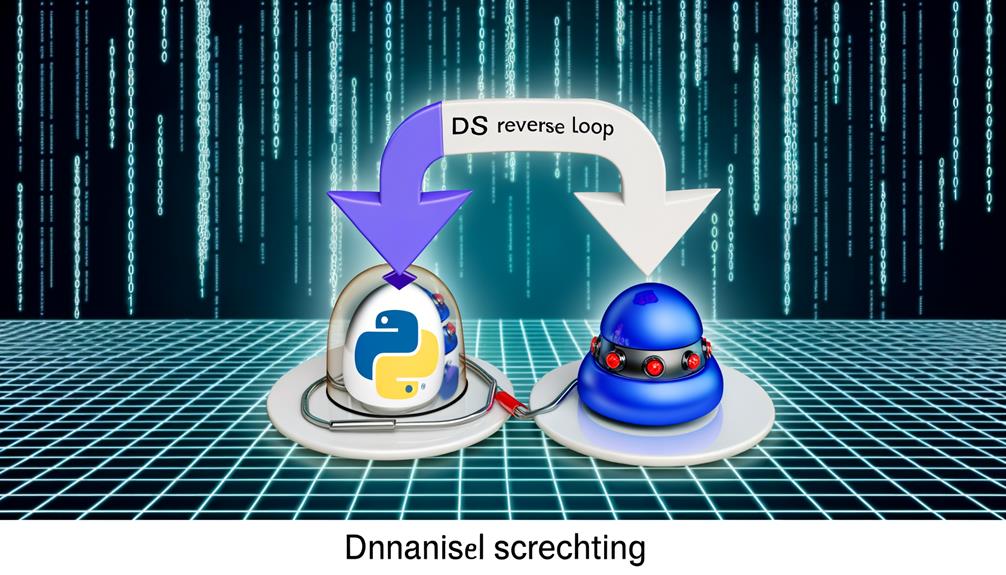To perform a DNS Reverse Lookup for Googlebot using Python, we'll be using the socket module. This provides internet access, enabling the Lookup process. In our Python script, we'll utilize the gethostbyaddr() method for the lookup and ensure accurate SEO analysis. We'll also verify the Googlebot IPs by harnessing the socket and CSV modules. The proof is in the performance of these strategic steps: not only will our SEO analysis be optimized but our server security shall be bolstered too. Stick around, there's more hands-on insights you can glean to improve your IT skills and SEO strategy.
Key Takeaways
- Utilize Python's socket module to enable internet access necessary for DNS Reverse Lookup.
- Employ the gethostbyaddr() method from the socket module, which returns the true hostname for a given IP address.
- Use Python to identify potential Googlebot IP addresses, aiding in SEO optimization and server security.
- Validate the accuracy of the Python script for the DNS Reverse Lookup to ensure reliable verification of Googlebot.
- Optimize SEO analysis using Python's ability to crawl websites, analyze content relevance, and provide actionable insights.
Understanding DNS Reverse Lookup
To enhance server security and ensure accurate SEO analysis, we utilize DNS Reverse Lookup, a process that verifies a client's IP address as it appears to the server. This technical protocol is crucial in understanding server logs and the importance of IP verification. We analyze the IP data logged by the server, a key aspect of our security measures. Each IP address is meticulously checked against the DNS records to verify its legitimacy. This process helps us differentiate between genuine user traffic and potential threats. Moreover, our SEO analysis heavily relies on these server logs. By verifying the IP addresses, we ensure that our data isn't skewed by bot traffic or malicious activities. We've found DNS Reverse Lookup to be a valuable tool for maintaining server integrity and achieving accurate SEO results.
Exploring Pythons Socket Module

Having understood the importance of DNS Reverse Lookup in server security and SEO analysis, we now turn our attention to Python's Socket Module, a powerful tool that provides internet access and enables the DNS Reverse Lookup process. This module is a vital cog in the wheel of socket programming, providing an interface to the Berkeley sockets API. It facilitates server and client data transfer protocols, thereby playing a crucial role in network security. By creating a socket object using the socket() method, it paves the way for communication between server and client. It also offers secure connections via TLS and SSL using the SSL module, underscoring its importance in secure network transactions. An exploration of this module is indispensable for a comprehensive understanding of DNS Reverse Lookup.
Scripting for DNS Reverse Lookup

Let's dive into the heart of our discussion and unfold the mystery behind using Python scripting for DNS Reverse Lookup, a crucial process for verifying Googlebot and enhancing server security. To perform this task, we'll need to utilize Python's socket module, an essential tool for internet access and data transfer. Our python script will use the gethostbyaddr() method to execute the DNS Reverse Lookup, segregating Googlebot IPs from non-Googlebot IPs. We'll import necessary libraries like socket, csv, and glob to handle our data. The data analysis part involves sifting through a CSV file packed with random IP addresses. In the end, we'll have a reliable process to verify Googlebot, ensuring the accuracy of our SEO analysis and improving server security.
Googlebot Verification in Python

Diving right into Googlebot verification in Python, we harness the power of the socket and csv modules to identify and segregate Googlebot IPs from the rest, thereby optimizing our SEO analysis and fortifying server security. We leverage Python's DNS Reverse Lookup feature, using the socket module's 'gethostbyaddr' method. This, coupled with Python script validation, ensures accurate Googlebot identification.
Let's illustrate this with a table:
| Step | Description |
|---|---|
| 1 | Import socket, csv, and glob modules |
| 2 | Use socket's gethostbyaddr method for DNS Reverse Lookup |
| 3 | Segregate Googlebot IPs from non-Googlebot IPs |
| 4 | Validate Python script for accuracy |
The result is a robust, technical, and analytical approach to verifying Googlebot using Python, enhancing both SEO insights and server security.
Optimizing SEO With Python

In the realm of SEO optimization, Python serves as a powerful tool, allowing us to resize images in bulk, conduct insightful TF-IDF analysis for content relevance, and crawl websites to glean valuable SEO insights. With python automation, we can speed up these tasks, freeing us to focus on strategy and implementation.
Consider the following benefits:
- Python's simplicity and scalability make it ideal for processing large amounts of data quickly and accurately, leading to efficient SEO analysis.
- Using python for SEO analysis allows us to extract, process, and visualize large datasets, providing actionable insights.
- Python is flexible, allowing us to create custom SEO tools and scripts tailored to our specific needs.
Optimizing SEO with Python boosts our digital marketing efforts, driving more traffic and ultimately, conversions.
Python Applications in SEO

As we delve deeper into Python's capabilities, it becomes apparent that its applications in SEO are vast and multifaceted, ranging from bulk image resizing to complex text analysis. Python automation is a significant tool for SEO professionals, allowing us to streamline processes such as crawling, analyzing, and optimizing websites for search engines. For instance, we can automatically resize images in bulk for faster website loading times, a key SEO factor. Python also shines in keyword analysis, enabling us to identify trending keywords, analyze their relevance, and optimize content accordingly. Further, Python's powerful libraries make complex text analysis feasible, aiding in content optimization. Indeed, Python's versatility and robustness make it a go-to language for SEO applications.
Future of DNS Lookup in SEO

Looking ahead, the role of DNS Reverse Lookup, particularly in combination with Python, promises to revolutionize the SEO landscape. We foresee a future where machine learning applications and big data analytics will play a significant role in DNS Lookup. Here's what we anticipate:
- Machine learning applications will automate the process of DNS Reverse Lookup, making it faster and more accurate. This will help to distinguish genuine Googlebot from fake ones, improving SEO results.
- Big data analytics will help manage and analyze the enormous amounts of data generated by DNS Lookup, making it easier to understand trends and make informed decisions.
- Python's versatility and ease of use will allow for more sophisticated and customizable DNS Lookup tools, aiding SEO campaigns.
These advances will contribute substantially to SEO effectiveness and efficiency.
Benefits of Python in SEO

Harnessing the power of Python in SEO provides numerous advantages, including easy automation of repetitive tasks, advanced data analysis capabilities, and the development of custom tools tailored to unique SEO requirements.
Python's automation features streamline many SEO processes, reducing workload and enhancing productivity. Its powerful data analysis tools help extract meaningful insights from vast amounts of SEO data.
Here's a breakdown of the benefits in a table format:
| Benefit | Description | Example |
|---|---|---|
| Python Automation | Streamlines SEO tasks | Automating meta-data optimization |
| Data Analysis | Extracts insights from SEO data | Analyzing keyword trends |
| Custom Tools | Develop tools for unique SEO needs | Custom crawler for website audits |
These features make Python an invaluable resource in the SEO toolkit, enabling us to more effectively optimize websites and drive organic traffic.
Frequently Asked Questions
What Are Some Common Errors Encountered While Performing DNS Reverse Lookup?
We've noticed a few common errors when performing DNS reverse lookup. Occasionally, we encounter 'no response from server' errors, indicating connectivity issues. Sometimes, we get 'non-existent domain' errors, suggesting incorrect IP addresses. We've also seen 'server failure' errors, implying server issues. Our team's diligent error troubleshooting and lookup optimization techniques help us quickly identify and resolve these issues, ensuring our DNS reverse lookup process remains efficient and accurate.
How Can Pythons Socket Module Be Used in Other Applications Beyond Seo?
Beyond SEO, we're using Python's socket module in several innovative ways. It's crucial in developing chat applications, creating proxies, and designing server-client networks. We're utilizing socket programming basics to deliver real-time communication over the internet. Python networking applications have expanded exponentially, thanks to the flexibility and power of the socket module. It's revolutionizing how we approach network programming, making it more accessible and efficient.
What Are the Security Concerns Regarding the Use of Python for DNS Reverse Lookup?
We're aware of potential Python vulnerabilities when performing DNS reverse lookup. It's essential to implement safe scripting practices to mitigate security risks. Misconfigurations can expose sensitive data or allow unauthorized access. Furthermore, Python's flexibility can be exploited if software dependencies aren't properly managed. We recommend regular audits of script security, adhering to best coding practices, and staying updated on Python security developments.
How Does Verifying Googlebot Impact the Overall Performance of a Website?
We've found that verifying Googlebot significantly impacts website performance. This process aids in website optimization by ensuring only valid bots access your site, reducing unnecessary server load. It also refines traffic analysis by distinguishing genuine Googlebot traffic from potential threats. By implementing DNS Reverse Lookup in Python, we're able to maintain site efficiency, bolster security, and gain a clearer understanding of our SEO performance.
What Are the Potential Limitations or Challenges of Implementing Python in Seo?
We've found that the Python learning curve can be steep for those new to programming, posing a challenge for quick SEO optimization. Its syntax, while clean, requires precise understanding. Additionally, Python's performance speed may not match other languages, potentially slowing down real-time SEO analysis. Despite these difficulties, we believe mastering Python's capabilities is worthwhile for robust, automated SEO strategies. It's a matter of balancing immediate needs with long-term optimization goals.



